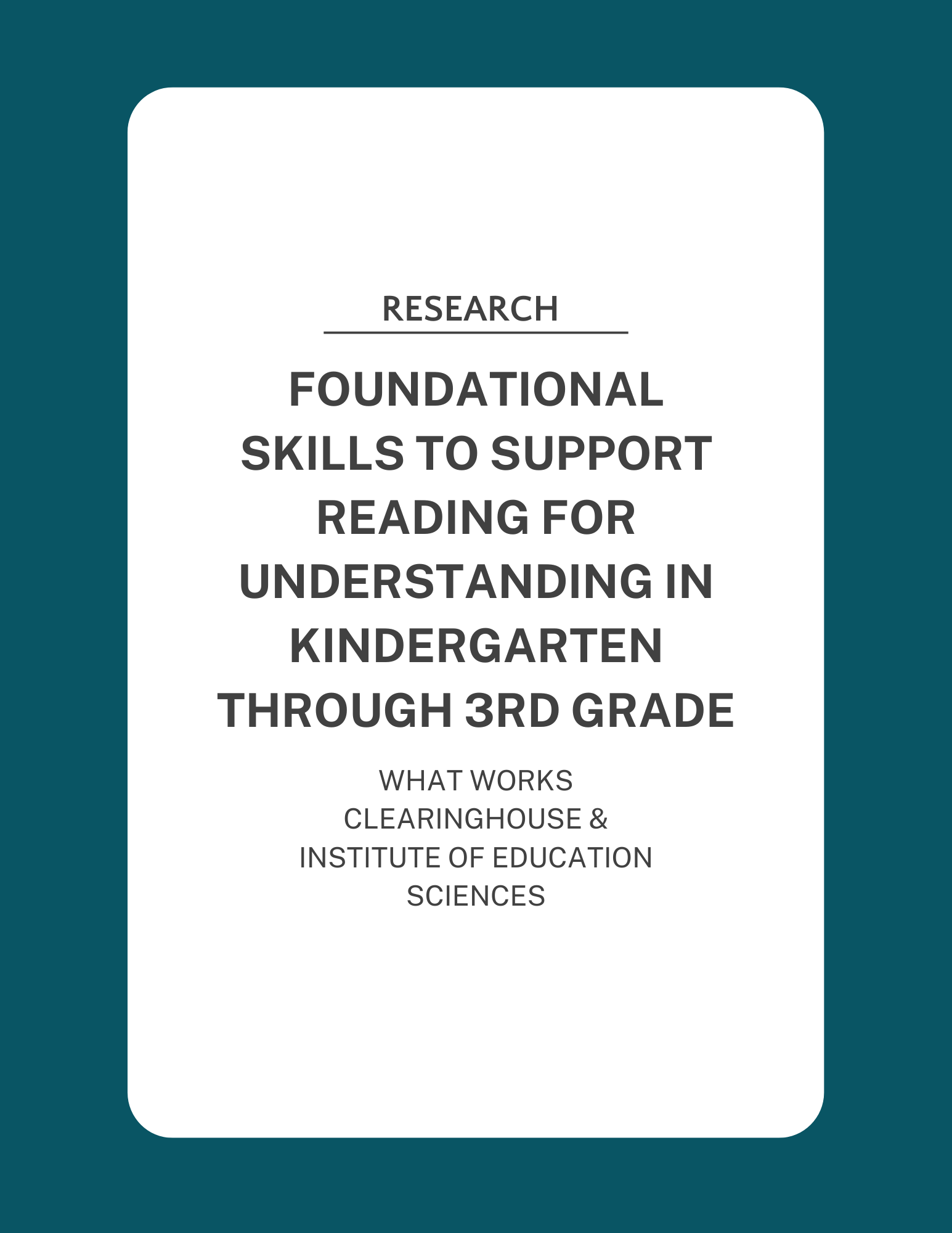Research
“Literacy is a fundamental human right. It is an instrument of empowerment to improve one’s health, one’s income, and one’s relationship with the world.”
- UNESCO
The Science of Reading is “a vast, interdisciplinary body of scientifically-based research about reading” that serves as a framework for how to develop proficient readers and writers (The Reading League). In 2000, the National Reading Panel Report identified "the big five" essential components of effective reading instruction: phonemic awareness, phonics, oral reading fluency, vocabulary, and comprehension. Scarborough's Reading Rope is a visual representation of how these multiple strands work together and lead to skilled reading.
The word recognition strand of the reading rope, often referred to as foundational skills, is taught in grades K-2, whereas language comprehension, such as vocabulary and knowledge-building, is much more complex and develops over a reader’s lifetime. While some students learn how to read through broad instruction, explicit and systematic instruction is necessary for most. Research shows that almost all students are capable of learning to read when they receive research-based instruction.
Education Advisory Board. Narrowing the Third-Grade Reading Gap - Embracing the Science of Reading. pg. 7.
Highlighted Research
Literacy leaders are learning, sharing, and acting on literacy research and evidence-based instructional practices to ensure all students become strong readers.
Three resources helping to guide the work:
Research Recap: Early Reading Accelerators: This resource from Student Achievement Partners highlights the research for early literacy as well as the crucial content necessary for proficient reading.
Foundational Skills to Support Reading Comprehension: This guide provides education practitioners with four concrete, research-backed recommendations for implementing foundational skills reading instruction that will positively impact students' reading growth.
Science of Reading Comprehension: This article from The Reading Teacher, written by Nell Duke, Alessandra Ward, and P. David Pearson, summarizes the research on reading comprehension and shares key elements for effective reading comprehension development.
Here is a sampling of readings leaders have explored.
Use the search menu below to access research by categories.
Research Supporting Foundational Skills in Reading
This document provides definitions and additional resources to refer back to for foundational concepts in the Science of Reading research in the form of an annotated bibliography.
How Schools Can Support Older Students Who Lag in Reading
This article details ways to support older students who struggle with reading with a focus on teaching foundational skills and improving literacy.
Speech to Print: Language Essentials for Teachers
This is a textbook on explicit literacy instruction that incorporates recent research and expanded guidance for educators to teach structured literacy effectively to K-12 students.
Know Better, Do Better: Teaching The Foundations So Every Child Can Read
What do children need to become successful early readers? This book is a guide to structured literacy and teaching foundational reading skills, and it includes resources for classrroom instruction.
Phonemic Awareness Instruction Helps Children Learn to Read: Evidence from the National Reading Panel's Meta-Analysis
This article synthesizes the results of two meta-analyses on phonemic awareness and phonics instruction. Through the examination of 52 studies, phonemic awareness instruction positively impacted students ability to read in all settings such as individual, small group, and classroom settings.
Making Personal Connections to Words to Increase Early Childhood Vocabulary Learning
A study of 30 core kindergarten teachers implementing Tier 1 instruction with their 215 students over multiple years. Using the personal connections strategy, which are teacher-initiated prompts that help students connect their experiences to the learning of new words, can support knowledge-building conversations around words and can be combined with other evidence-based vocabulary learning practices.
Advancing Our Students' Language and Literacy: The Challenge of Complex Texts
This article presents research that supports explicit foundational skills instruction, highlighting its significance for students' reading development. It offers insights into evidence-based teaching practices and program components to improve early reading experiences through informed classroom instruction, material selection/design, and professional learning.
Science of Reading: Defining Guide
This resource from The Reading League gives an overview of key components and definitions for foundational Science of Reading concepts and explains their importance.
Structured Literacy: Applying the Science of Reading in the Classroom
This white paper from Lexia Learning emphasizes the importance of structured literacy as the embodiment of the science of reading in classrooms. It differentiates authentic approaches from less-supported ones to ensure effective instruction.
Teaching Children to Read: An Evidence-Based Assessment of the Scientific Research Literature on Reading and Its Implications for Reading Instruction
In 1997, the U.S. Congress initiated the formation of the National Reading Panel (NRP) to evaluate effective reading instruction methods. The NRP focused on key areas like phonemic awareness, phonics, fluency, comprehension, and teacher education in its assessment of the Scientific Research Literature on Reading and Its Implications for Reading Instruction.
Foundational Skills to Support Reading for Understanding in Kindergarten Through 3rd Grade
This guide provides education practitioners with concrete recommendations for implementing foundational skills reading instruction into their practices in order to build their students' foundational reading skills effectively. The guide offers four, research-backed recommendations that will positively impact students' growth.
Foundational Skills Guidance Documents Grades K-2
This document outlines guidance around foundational skills that are necessary to incorporate in K-2 reading instruction. Foundational skills include: print concepts, phonological awareness, phonics and word recognition, and fluency. Educators should utilize this guide along with already developed instructional materials in order to apply these skills into practice.














